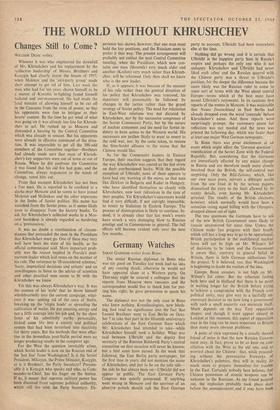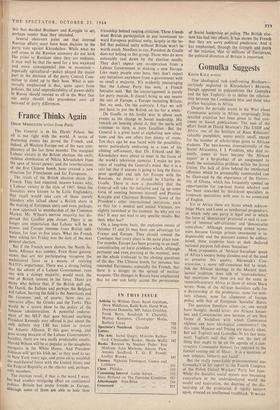Germany Watches
SARAH GAINHAM writes front Bonn:
The senior Russian diplomat in Bonn who was my guest on Tuesday last week had no idea of any coming shock; otherwise he would not have appeared alone at a Western party. On Thursday night he assured a colleague that the reports from Moscow were rumours and the correspondent would live to thank him for put- ting him right; he gave permission to quote his name.
The diplomat was not the only man in Bonn who knew nothing. Kremlinologists, now blush- ing, had read no significance into the fact that Leonid Brezhnev went to East Berlin on Octo- ber 7 to take that part in the fifteenth anniversary celebrations of the East German State which Mr. Khrushchev had intended to take—while Khrushchev himself took a holiday. What was said between Ulbricht and the deputy first secretary of the Russian Bolshevik Party's central committee on that occasion will never be known; but a hint must have passed. In the week that followed, the East Berlin party newspaper, for the first time in years, did not mention the name of Khrushchev, and just to be on the safe side— the side he has always been on—Ulbricht did not appear in public. The East German Party Congress was quietly postponed. If anything went wrong in Moscow and the survivor of an abortive putsch should call the East German party to account, Ulbricht had been somewhere else at the time.
Nothing 'did go wrong and it is certain that Ulbricht is the happiest party boss in Russia's empire and perhaps the only one who is not unhappy. Khrushchev and Ulbricht had never liked each other and the Russian quarrel with the Chinese party was a threat to Ulbricht's position, for the deeper the difference became the more likely was the Russian ruler to come to some sort of terms with the West about central Europe—terms which at the best must have meant Ulbricht's retirement. In its cautious first reports of the events in Moscow, it was noticeable that Neues Deutschland in East Berlin had already dropped even the word 'comrade' before Khrushchev's name. And these reports were surprisingly prompt; the customary pause for reflection was not needed and the news was printed the following day, which was faster than at least one major West German newspaper.
In Bonn there was great excitement at an event which might affect the 'German question': reunification of the Soviet Zone with the Federal Republic. But, considering that the Germans are immediately affected by any major change in Russia and are therefore much more closely involved than the British, the self-control was surprising. Only the Bild-Zeitung, which, like our own mass press, mirrors a differgnt world from the one lived in by the serious papers, dramatised the story to the limit allowed by its scanty details, even having Mr. Khrushchev arrested. The results of the British elections, however, which normally would have been a sensation rating equal billing with the Olympics, dropped almost out of sight.
The two questions the Germans have to ask of the new British Government seem likely to remain un'answered for some time. Unless the Chinese make fast progress with their bomb, which still has a long way to go to be operational. British participation in the multilateral nuclear force will not be high on Mr. Wilson's list of decisions to be taken and the Government is aware that, contrary to general belief in Britain, there is little German enthusiasm for the project. It is believed, too, that Washington is beginning to doubt the realism of the idea.
Eucope, Bonn assumes, is not high on Mr. Wilson's list either. But the reluctant feeling both here and in Holland that there is no point in waiting longer for the British before trying to 'achieve a compromise with the French over political unity, may give way to a tactfully un- expressed decision to see how long a government with such a small majority can maintain itself. Much depends on the way Tory opposition shapes; and though it must appear absurd in London at this moment, this aspect of opposition may in the long run be more important to Britain than many more obvious problems.
A point of view expressed by a usually shrewd friend of mine is that the new Russian Govern- ment may, ii fact, prove to be as keen on con- ciliation with the West as the old one, and as worried about the Chinese: that, while proceed- ing without the provocative fireworks of Khrushchev's polemics, they will in reality do much more to prepare themselves for trouble in the East. Certainly nobody here believes that Chinese possession of atomic weapons can be welcome to the Russians. As my friend pointed out, the explosion probably took place days before the announcement and it may have been
this that decided Brezhnev and Kosygin to act, perhaps sooner than they intended.
Several observers point out that internal Russian affairs must have been decisive in the party vote against Khrushchev. While what we call crises in the Russian economy do not look like crises to Russians since they are endemic, it may well be that the need for a less wayward and more consequential line in economic— especially agricultural—policy played the major part in the decision of the party Central Com- mittee to stand up to their boss. What is uni- versally emphasised is that, quite apart from policies, the total unpredictability of power-shifts in Russia should remind us all in the West that our unity should take precedence over all national or party differences.



































 Previous page
Previous page